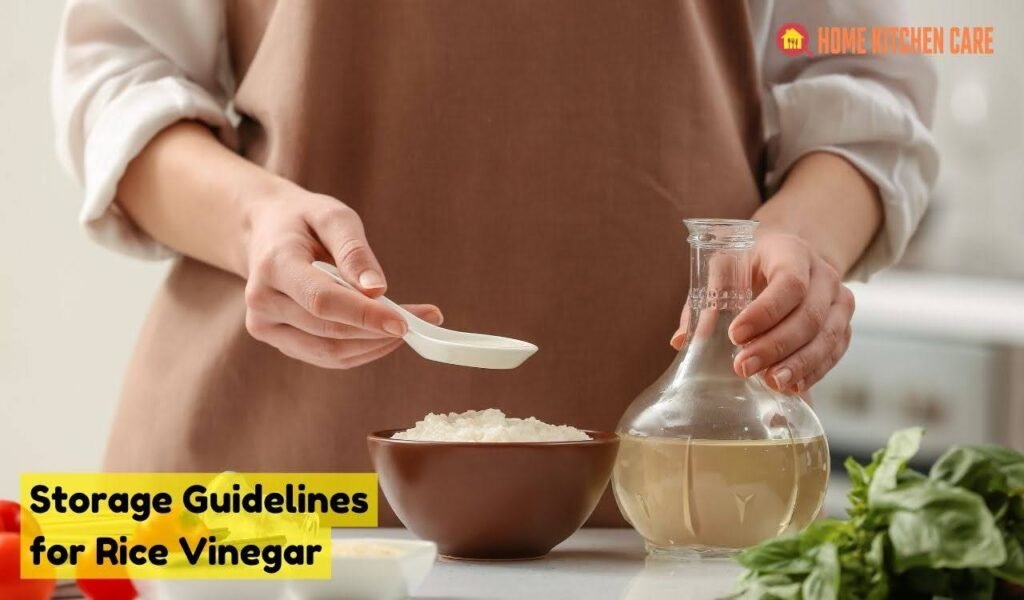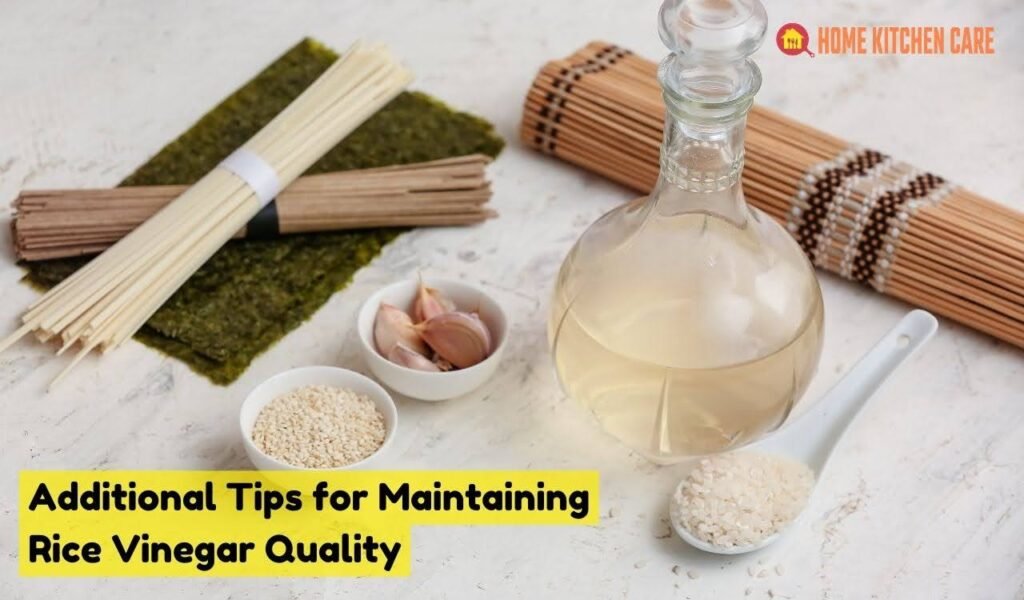Physical Address
304 North Cardinal St.
Dorchester Center, MA 02124
Physical Address
304 North Cardinal St.
Dorchester Center, MA 02124

Do you need to refrigerate rice vinegar? The answer might surprise you. From enhancing flavors to extending shelf life, the storage of this versatile ingredient holds secrets worth uncovering. Whether it’s about preserving taste or debunking myths, let’s dive into the ins and outs of storing rice vinegar.
Get ready for a guide that unlocks the best-kept secrets behind this kitchen essential. Let’s explore together and ensure your culinary creations are always at their flavorful best!
Main Summary: Do You Need to Refrigerate Rice Vinegar?
Rice vinegar doesn’t need refrigeration but benefits from a cool, dark storage space. Its acidity inhibits bacterial growth, allowing it to be stored at room temperature. However, refrigeration can maintain its flavor longer. Seal the bottle well for freshness, regardless of storage choice.
Rice vinegar is a type of vinegar made from fermented rice. It originates from East Asia, particularly Japan, China, and Korea, and holds a significant place in their culinary traditions. Its production involves fermenting rice or rice wine until it transforms into vinegar through a natural fermentation process.
This vinegar boasts a mild, slightly sweet flavor profile compared to other types of vinegar, such as white or apple cider vinegar. It comes in various varieties, including white rice vinegar, black rice vinegar, and seasoned rice vinegar. Each variation offers unique taste nuances, colors, and uses in cooking.
Due to its delicate flavor, rice vinegar is a popular ingredient in Asian cuisine, often used in sushi rice, salad dressings, marinades, pickles, and sauces. Its acidity levels contribute to tenderizing meats, adding tanginess to dishes, and balancing flavors in various recipes.
Beyond its culinary applications, rice vinegar is also known for its potential health benefits. Some studies suggest it may possess antioxidant properties and could aid in digestion, although further research is needed to confirm these claims conclusively.
Overall, rice vinegar’s versatile taste, numerous culinary uses, and potential health properties make it a beloved ingredient in kitchens worldwide.
The question of whether to refrigerate rice vinegar is a common query among culinary enthusiasts. While opinions vary, experts provide valuable insights into the best practices for storing this versatile ingredient.
Rice vinegar possesses natural preservatives, primarily acetic acid, which inhibits bacterial growth and extends its shelf life. Unlike some perishable food items, unopened bottles of rice vinegar remain stable at room temperature for an extended period.
Several factors can influence whether refrigeration is necessary for rice vinegar:
Ultimately, whether to refrigerate rice vinegar depends on individual preferences and usage patterns. While refrigeration can potentially prolong its quality, it’s not strictly necessary for unopened bottles or those frequently used.
While refrigeration might be advised for maintaining optimal quality over an extended period, unopened rice vinegar and regularly used bottles can typically be stored at room temperature without compromising safety or taste. Adhering to proper storage conditions and periodic quality checks can ensure enjoyable culinary experiences with rice vinegar.

Proper storage of rice vinegar is crucial to maintaining its flavor, quality, and shelf life. Here are comprehensive guidelines to ensure your rice vinegar stays fresh and flavorful:
By following these storage guidelines, you can ensure that your rice vinegar retains its distinct flavor and quality, enhancing the taste of your culinary creations. Whether stored at room temperature or in the refrigerator, proper sealing and protection from light and heat are key to preserving this versatile ingredient.
Refrigerating rice vinegar offers several benefits that can enhance its shelf life, maintain quality, and ensure its usability over an extended period:
While refrigeration isn’t strictly necessary for unopened bottles or frequently used rice vinegar, it offers advantages in preserving its quality, flavor, and aroma over an extended period. This practice becomes particularly beneficial when the vinegar is used infrequently or when aiming for optimal longevity.
By refrigerating rice vinegar, you can ensure its consistent quality and flavor, enabling you to enjoy its culinary benefits in various dishes without concerns about degradation or spoilage.
Rice vinegar, a kitchen staple cherished for its mild flavor, can undergo changes indicating spoilage. Detecting these signs is crucial for maintaining safety and quality in culinary endeavors.
While rice vinegar contains natural preservatives like acetic acid, preventing bacterial growth, certain conditions can lead to spoilage and safety hazards.

Ensuring the longevity and quality of rice vinegar involves prudent storage practices and vigilant monitoring.
Embracing these measures can significantly enhance the safety and quality of rice vinegar, ensuring a delightful culinary experience without compromising on flavor or well-being.
While refrigeration can extend the shelf life and maintain the quality of opened rice vinegar, it’s not imperative for unopened bottles or those used frequently. Proper sealing, storage in a cool, dark place, and periodic checks for spoilage signs suffice for maintaining its integrity. Ultimately, whether to refrigerate rice vinegar depends on individual preferences and usage patterns, ensuring enjoyable culinary experiences with this versatile ingredient.
Rice, when uncooked, can be stored at room temperature in a cool, dry place. Once cooked, it’s advisable to refrigerate leftover rice within two hours to prevent bacterial growth.
Unopened bottles of rice vinegar can be stored at room temperature in a cool, dark place. However, for maintaining quality, it’s recommended to refrigerate opened bottles to preserve flavor and prolong shelf life.
Refrigerating rice vinegar after opening can help maintain its quality for an extended period. Typically, it can last for several months to a year when refrigerated, maintaining its flavor and aroma.
Yes, refrigerating opened bottles of rice vinegar is advisable to retain its quality. This helps prevent changes in flavor, color, and aroma, ensuring a longer shelf life.
When stored properly in the refrigerator, opened rice vinegar can maintain its quality for several months to a year. Regularly check for any signs of spoilage, such as changes in odor, color, or taste.
Unopened bottles of rice vinegar can be stored at room temperature without immediate spoilage. However, refrigerating opened bottles is recommended to prolong its shelf life and preserve its quality.
After opening, ensure the bottle is tightly sealed and store it in the refrigerator. This helps maintain the vinegar’s flavor, aroma, and quality over an extended period, ensuring its usability in various culinary endeavors.